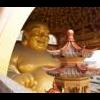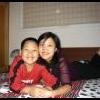Search the Community
Showing results for tags 'Cultural revolution'.
-
She Witnessed Mao’s Worst Excesses. Now She Has a Warning for the World. At 93, the memoirist Yuan-tsung Chen hopes that her recollections of China’s tumultuous past will help the country confront its historical wrongs — and avoid repeating them. The author Yuan-tsung Chen at her home in Hong Kong in July. Her latest book is “The Secret Listener: An Ingenue in Mao’s Court.”Credit...Anthony Kwan for The New York Times from the New York Times Jan. 13, 2023
-
. . . from the Global Times Freelancers struggle to get images on sensitive topics shot, published
-
I know we started a book discussion topic at some point but it's probably long lost in the paleontology here. I thought I would mention a great book I have been reading about China called, Out of the Gobi, by Weijan Shan. Shan is a globally recognized financier who went from literally nothing to a Ph. D. in Economics in 10 years. The book is a memoir, not a history, of his life, but quite revealing in its portrayal of life in China during the Cultural Revolution. He was sent to the Gobi desert as part of Mao's re-culturation of China in the mid-60's. He provides a deep discussion of what it was like to be uprooted from Beijing and sent to a place to work in the harshest of conditions, little food or water, with work every day going into the night. He was appointed a "barefoot doctor" for his company of men (and women), and then lost that job due to corruption of the local commanders. A lot of his writing explains to me why the Chinese are the way they are. Mao is still in the blood of our wives, husbands, and children now. Such things as why there is little display of affection, or an over-compensation for not having it. The one child policy. The complete separation of men and women, boys and girls. Entire families broken and sent to camps, never to be re-united. It reads like an adventure, but one steeped in sadness, and triumph. From the Foreword by Janet Yellen Weijian Shan's Out of the Gobi is a powerful memoir and commentary that will be one of the most important books on China of our time, one with the potential to re-shape how Americans view China, and how the Chinese view life in America. Shan, a former hard laborer who is now one of Asia's best-known financiers, is thoughtful, observant, eloquent, and brutally honest, making him well-positioned to tell the story of a life that is a microcosm of modern China, and of how, improbably, that life became intertwined with America. Out of the Gobi draws a vivid picture of the raw human energy and the will to succeed against all odds. Shan only finished elementary school when Mao Zedong's Cultural Revolution tore his country apart. He was a witness to the brutality and absurdity of Mao’s policies during one of the most tumultuous eras in China’s history. Exiled to the Gobi Desert at age 15 and denied schooling for 10 years, he endured untold hardships without ever giving up his dream for an education. Shan’s improbable journey, from the Gobi to the “People’s Republic of Berkeley” and far beyond, is a uniquely American success story – told with a splash of humor, deep insight and rich and engaging detail. This powerful and personal perspective on China and America will inform Americans' view of China, humanizing the country, while providing a rare view of America from the prism of a keen foreign observer who lived the American dream. * * * I highly recommend this book for anyone curious of how the history of China affects the ones we love, even when they may not be aware of how.
-
Three things you don't see in China very often are rifles, firing ranges, and Republic of China flags. Huang Shaohong was a Kuomintang delegate to the peace talks after the Chinese Civil War in 1949. He helped negotiate the peace treaty which was rejected by the Kuomintang leadership. He later joined the Communist Party, but was labeled a 'rightist' during the Cultural Revolution and ultimately committed suicide in 1966. We visited his home near Rongxian in the Yulin prefecture. See in Wikipedia - Huang Shaohong
- 3 replies
-
- 1
-

-
- yulin
- cultural revolution
-
(and 1 more)
Tagged with:
-
1965 - the East is Red from the Shanghaiist (on Facebook, but with public access) https://www.facebook.com/video.php?v=10152754907186030 On YouTube the entire opera (the Shanghaiist clip is the first 6½ minutes of this)
-
in the SCMP Cultural Revolution, 50 years on – the pain, passion and power struggle that shaped China today http://multimedia.scmp.com/cultural-revolution/images/article/311re-lie-huan-hu-shanghai-poster.jpg
-
50 years ago today 1966: China Admonishes Red Guards By INTERNATIONAL HERALD TRIBUNE AUGUST 28, 2016 10:11 AM
-
in the SCMP Faithful gather in praise of former Communist leader Mao Zedong in Hunan on his birthdayDespite officials’ efforts to deter attendance, thousands of devotees descend on chairman’s hometown http://www.scmp.com/sites/default/files/styles/486w/public/images/methode/2015/12/27/59f25050-abc1-11e5-88e2-828a3e695a05_486x.jpg?itok=5EaZt0Y2
-
from China Pictorial, a VERY interesting article on the emergent Chinese culture of the 80's and 90's Beijing Silvermine: Nostalgia from Negatives
-
I've been interested in the cultural revolution since my wife and I met. It was a tough time for her as a child. She knows what it's like to go to bed hungry. As a young woman she was forced to go work in the countryside on a farm. Her father was sent to a work farm for two years because someone who didn't like him accused him of things he wasn't guilty of. The Red Guard terrorized the nation destroying so many priceless artifacts. My wife calls it "the ten years China was crazy." I heard this story on Public Radio International today and thought it fascinating. The Chinese government still doesn't like to talk about it but a few people are now coming forward and apologizing for their part at the time. One business near Beijing has a performance where they sing the old patriotic songs and period costumes. The story is HERE
-
A fascinating little piece of recent Chinese history from the Global Times Always on the losing side This from a country whose lawyers major in 'Politics and Law'.
-
I ran across this today while reading the news. I thought it interesting. http://lens.blogs.nytimes.com/2012/09/10/through-a-thwarted-cinematographers-eye-chinas-cultural-revolution/?_r=0
-
Just an interesting article about free speech in China and 'red nostalgia' from the Global Times Freedom of speech applies to Mao followers and critics alike http://www.globaltimes.cn/content/801613.shtml#.UgBcMdIwd2E
-
from the New York Times Cultural Revolution Vigilantes
-
Some of you may know that Nanjing was invaded by the Japanese, before they launched the attack on Pearl Harbor. The Japanese were brutal to the people of Nanjing, and murdered and raped more than 300,000 Chinese men, women, and children. The Chinese are very sensitive about this topic, and Japan has never formally admitted to the atrocities its soldiers committed here. Even though I have lived in Nanjing for almost four years, I was very reluctant to visit the holocaust museum. I did go once with a friend however, and as you can imagine it's a sad and somber place. This Christmas, the Chinese made and directed movie, "The Flowers of War" is being released. I went with several of my Chinese colleagues to see this movie yesterday, and was completely impressed and touched by it. It stars Christian Bale, who plays an opportunistic Westerner, who was in China drinking too much, and doing anything he could to make and swindle money. He did his best to escape the advancing Japanese troops, and met up with some young Chinese girls who were part of a convent. It's a bit of a tear-jerker, with both English and Chinese subtitles. It's a must see for those of you who have interest in China, or have a Chinese wife or girlfriend. While the movie is based on a novel, still much of the content is based in fact. The acting, characters, and cinematography are nothing less than fantastic.





